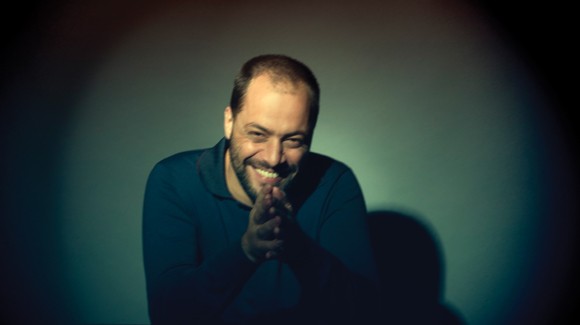
António Zambujo Tour in the US
TOUR
New York, NY
Highline Ballroom | March 1st
+ Tickets
New Bedford, MA
Zeiterion “Special Events Series” | March 2nd
+ Tickets
Montalvo Arts | March 4th
+ Tickets
MIM | March 14th
+ Tickets
++
“…when you listen to Zambujo it moves you to the core. He’s a young fado singer who, by intensifying fado tradition much more than many of his fellow fado singers, evokes João Gilberto and all that he has given to Brazilian music.”
– Caetano Veloso
This time around, Zambujo chooses a different and cozy trip, limited only on the surface. But as it turns out, he is capable of unfolding secrets and mysteries that we often overlook or ignore. Such is the pilgrimage António commands from beginning to end on Rua da Emenda, door to door, step by step, stone by stone. This street that both reveals itself as a narrow alley adequate for the love of a fadista, and a broad avenue on a larger scale summoning the whole world (Brazil, France, Uruguay, Africa) to this small Portuguese dimension, where waltzs – and there’s three of them – and sambas (or is it “zambas”?) are allowed to sleepover. Keeping up with the usual dynamics and intensity, every waltz, every samba, every song, they all run as fast as they can from the grab of purists, working as a haven to popular characters (the tram inspector) or part of a collective imaginary (in Flinstones). The funny thing is that by showing a genuine respect (albeit not necessarily prim) for each one of his ‘neighbors’, António Zambujo and the musicians who accompany him on this unhurried walk accomplish a rare harmony and understanding that reminds us of those times where we all knew each other in the street we lived in and felt more available to help instead of judge. The characters Zambujo brings (back?) to our lives have a life and a breathing of their own; but on the very first listening of Rua da Emenda it becomes clear to everyone they look incredibly good in a group photo.
Rua da Emenda’s calling card is handed to us through the reunion of Zambujo with one of his oldest writing partners, Miguel Araújo. The two of them draw directly in our memories – the scenery is this tram where so many affections are exchanged whenever a ticket goes from one hand into another. One could state the trails are actually the furrows designed as the only measures – not limits – available while rambling in a street (rua) that has different heartbeats, rhythms and humors, way beyond any traffic limitations. Guided by this singing signaller, everyone has their own place here. There aren’t even parking problems: the usual contributors have their own private parking space – from João Monge to Maria do Rosário Pedreira, from José Eduardo Agualusa to Pedro da Silva Martins; but there also new and wide spaces ready to be used in a party mood by newcomers as Samuel Úria and José Fialho Gouveia. It’s always like this when António Zambujo’s voice is the known destination.
Geography too seems to apply perfectly to this street’s dimension, where the immortal talent of Noel Rosa can fit in a split second, confirming António Zambujo’s infatuation for an infinite Brazil. Or Serge Gainsbourg, who would certainly love to hear his Chanson de Prévertsubverted by the labyrinths born out of the Portuguese guitar. That godlike universe is sported side by side with new contemporary authors like Jorge Drexler (Óscar winning Uruguayan musician), Rodrigo Maranhão and Pedro Luís (two first class Brazilian songwriters) without discussing hierarchies. It is from these latitudes of impeccable taste that arouses the perfume which reinforces the strong spices left in the hands and the throat of António Zambujo by the Portuguese poets. António’s effortless voice sounds like it was invented to hover and glide always some feet off the ground, always on top, all the more thrilling whenever we are reassured that there is no screaming capable of matching such feeling and restraint mastery, both flawless and excess free.
Besides, he does not care for artificial frontiers and aesthetic enemies. What we have before us is a deeply Portuguese work, not only for its disquiet sweetness, but also for the jangly balance given by a well-crafted instrumentation, adjusted to the singer’s calm and contagious timbre. But Rua da Emenda is also a street of the world, thanks to the solid guitars, the contrasting horns, the nascent accordion, all from the likes of exceptional musicians as Bernardo Couto, Carlos Manuel Proença, João Salcedo, João Moreira, José Miguel Conde, Ricardo Cruz, José Manuel Neto and Pedro da Silva Martins, among others. It’s generous too – after all, there are 15 doors that swing open to every passer-by. It’s also coherent – much more so than just the unique voice that conducts the whole travel. And diversified, in consequence of the variety of solutions emerging from each stop. And still certainly fascinating, particular to all that is simple, authentic, tangent to our lives but only explicit when brought forth by amazing talent. And there is no lack of talents here, all adding up so that António Zambujo may, once again, be acclaimed, supported and adored by a cheering crowd.

